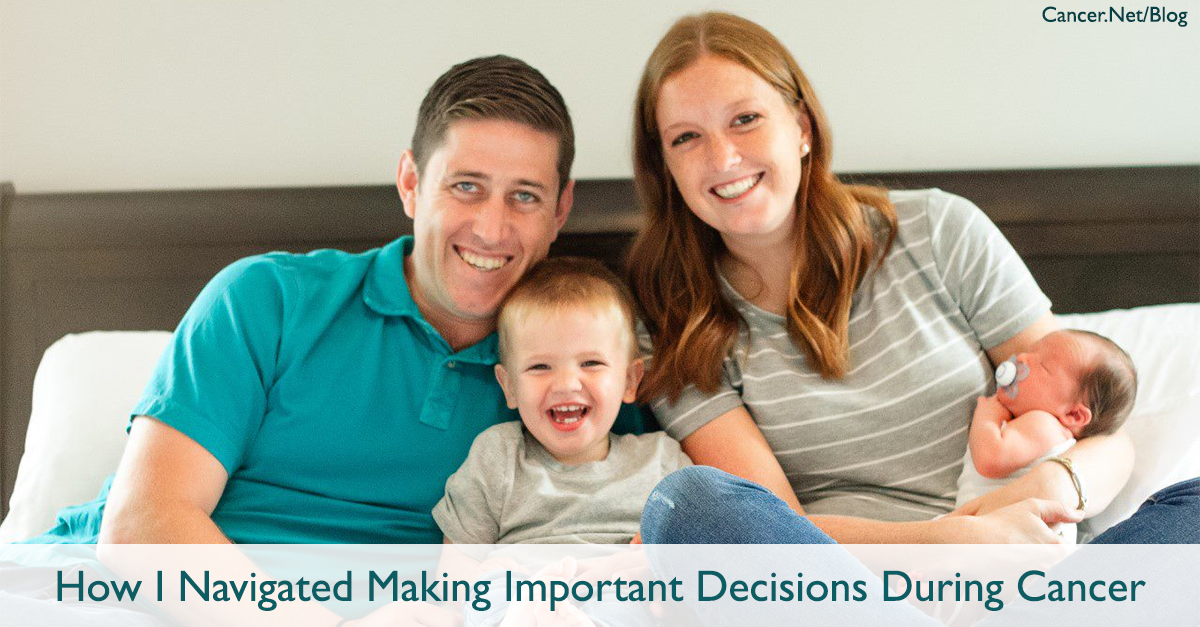
Bethany Hart lives with her husband Kevin, sons, and 3 dogs in the suburbs of Indianapolis, Indiana. She is a survivor of small cell neuroendocrine cervical cancer. After being declared cancer-free, Bethany and Kevin launched a nonprofit, The HallieStrong Foundation, in memory of their daughter. HallieStrong sends free care packages of fun socks to people with cancer. You can follow Bethany on Twitter.
Time has never passed so slowly in my life as it did in those moments after I heard the word “cancer.” It was as if I was catapulted into some sort of time warp where everything stopped and blurred together. I remember vividly hearing the word “cancer,” but I don’t remember much after that. I know the doctor kept talking at me, and I know there was a lot of information being shared. But at the time, I didn’t have the ability to listen. I was only hearing mumbled words on my end. I didn’t have words, just tears. I couldn’t feel anything but my husband’s arms gripping my shoulders. Seemingly in slow motion, my perfect (as can be) life was thrown out the window, replaced with fear, anger, deep grief, and utter confusion.
When we walked out of the hospital, I actually said to my mom and husband, “What are we supposed to do now?”
For me, it took 3 days for the results of my pathology report to come back. They were 3 tortuous days of waiting. Waiting might be one of the hardest things to do in life, and it’s something I still struggle with to this day, I think because of this experience.
Once my results came back and my type of cancer was classified, we were immediately faced with a million decisions to make and pieces of information to process. Overwhelming doesn’t begin to describe what life felt like in the wake of that phone call. A sage piece of advice I’d gotten once was to never make any big life decision in an emotional state. Always give yourself time. But what happens when you don’t have time? No person with cancer has the luxury of time. I sure didn’t. So what happens then?
Navigating my cancer diagnosis
That first day or two after my diagnosis, I remember feeling paralyzed. I couldn’t even begin to talk or think about a “game plan” because I couldn’t understand what had just happened to me, how it happened, or why it happened. I spent that time on the phone with my closest friends and family members replaying that doctor’s appointment and sharing a lot of tears, a lot of shock, and a lot of silence.
I remember starting to get questions about second opinions as time passed. Given my diagnosis, how rare and aggressive my cancer was, and how awful our circumstances were, particularly given I was pregnant at the time, I had people researching the greatest doctors across the country and offering to do whatever it took to get me in. While I appreciated all of that, I couldn’t process any of it. If I’m being honest, I remember resenting it. I’m sure that was so confusing for others, but the reality was that I had no ability to think of what would be next. I couldn’t get past the present. I didn’t want to accept any of it. How could I when I was facing my own mortality head on? And for me, I then also had to face the mortality of our unborn daughter, out of nowhere.
Then, a couple of days later, I remember waking up, and it was as if a switch had flipped in me. My desire to fight was raging, and there was no chance I was going back to that doctor or taking his word as the final say. I remember telling my husband that I wanted to go meet my parents for breakfast and start talking through options. I will forever remember him saying, “There it is! And let’s go!” I’ve always had a very competitive, defiant streak in me.
Making important decisions during cancer
We went to breakfast that day, and I remember listening to recommendations on doctors. We had found one of the best doctors in the world, and he was ready to see me if I said the word. A few days later, I was in his office. He did the same tests and gave me the same diagnosis as the first doctor had, sealing my horrifically sad fate, but he handled it with such tremendous grace that I knew I had found my doctor. At one of my appointments later on, I heard this same doctor in the hallway say to his resident, “Make sure you take care of my girl in there.” That’s a doctor you want in your corner.
My timeline between being diagnosed and starting active treatment was about 2 weeks. For perspective’s sake, within those 2 weeks, I had—no exaggeration—hundreds of conversations about “what ifs” and “how tos.” I had so many tests and scans. Cancer doesn’t typically offer black and white options, especially for my cancer that had only 1 line of defense defined and nothing further, with a survival rate of 15% at 2 years. There were tumor boards where experts poured over every little detail to come up with the best possible game plan. For me, that game plan meant surgery, chemotherapy, and radiation therapy. For others, it meant immunotherapy, clinical trials, and more. Everything was a gamble. We were constantly weighing risks based on the information we had, with absolutely zero guarantee that I’d live to see age 32.
This October, I will be 5 years removed from my diagnosis. We beat the odds. I say “we” because there was no “I” in my cancer fight. My incredible medical team, my husband, and my family and friends who walked every day with me and still do have all been part of my cancer experience.
What helped me make the best decisions for me during cancer
Reflecting back on those 2 weeks now, with the gift of perspective that only time can provide, I try my best to empathize with every person with cancer I cross paths with who may be in the thick of their “2 weeks.” My advice to them is always the same: feel your feelings first, and feel them big! This is arguably one of the most traumatic things to go through in life. You are going to be processing your own mortality out of nowhere. Scream. Yell. Cry. Sit in silence. Go for walks. And give yourself so much grace. Know these are feelings you’re going to have for the rest of your life. Some days these feelings will be big, some days small, and some days they’ll come out of nowhere. Grace is often your only option.
Next, find your trusted circle, both medically and personally. Medically, you want to find a team that you trust implicitly and that you feel completely supported by, both physically and emotionally. Cancer often teaches people how to be the biggest advocate for themselves, so if something doesn’t feel right, act on it. You know what you need and what’s best for you, so fight for you!
Personally, I learned not to try to fight cancer alone. Find your close circle of family and friends that will allow you to feel, and talk, and scream, and cry, without any judgment, even when things get really, really dark. Find the circle that will treat you like the same old you, before cancer. Find those who aren’t afraid to drop a little humor, which really can be a silver lining throughout the experience. Also, try finding a cancer buddy, or someone who is going through exactly what you’re going through, as they can help give you validation and provide a daily “gut check.”
And lastly, my advice is to take cancer 1 minute at a time, not 1 hour or 1 day. That’s too much pressure with cancer, especially because of how unpredictable and unfair side effects are and how deeply traumatic the experience can be. So, take it minute by minute. Find some “normalcy.” Laugh! If you’re feeling scared, cry. Call your husband and scream. Punch a pillow until you’re exhausted. If you’re feeling survivor’s guilt, talk about it, because almost everyone is! And if you’re feeling a side effect, call your doctor, because they will never make you feel silly, and your gut is always right. The point is, take it 1 step at a time. Everything with cancer is 1 step at a time.
Making decisions during cancer can be hard. There are going to be a lot of opinions and a lot of advice thrown your way. A cancer diagnosis can complicate some relationships and reveal true gold in others. Know that going in, and it’ll help keep you grounded.
The author has no relevant relationships to disclose.







